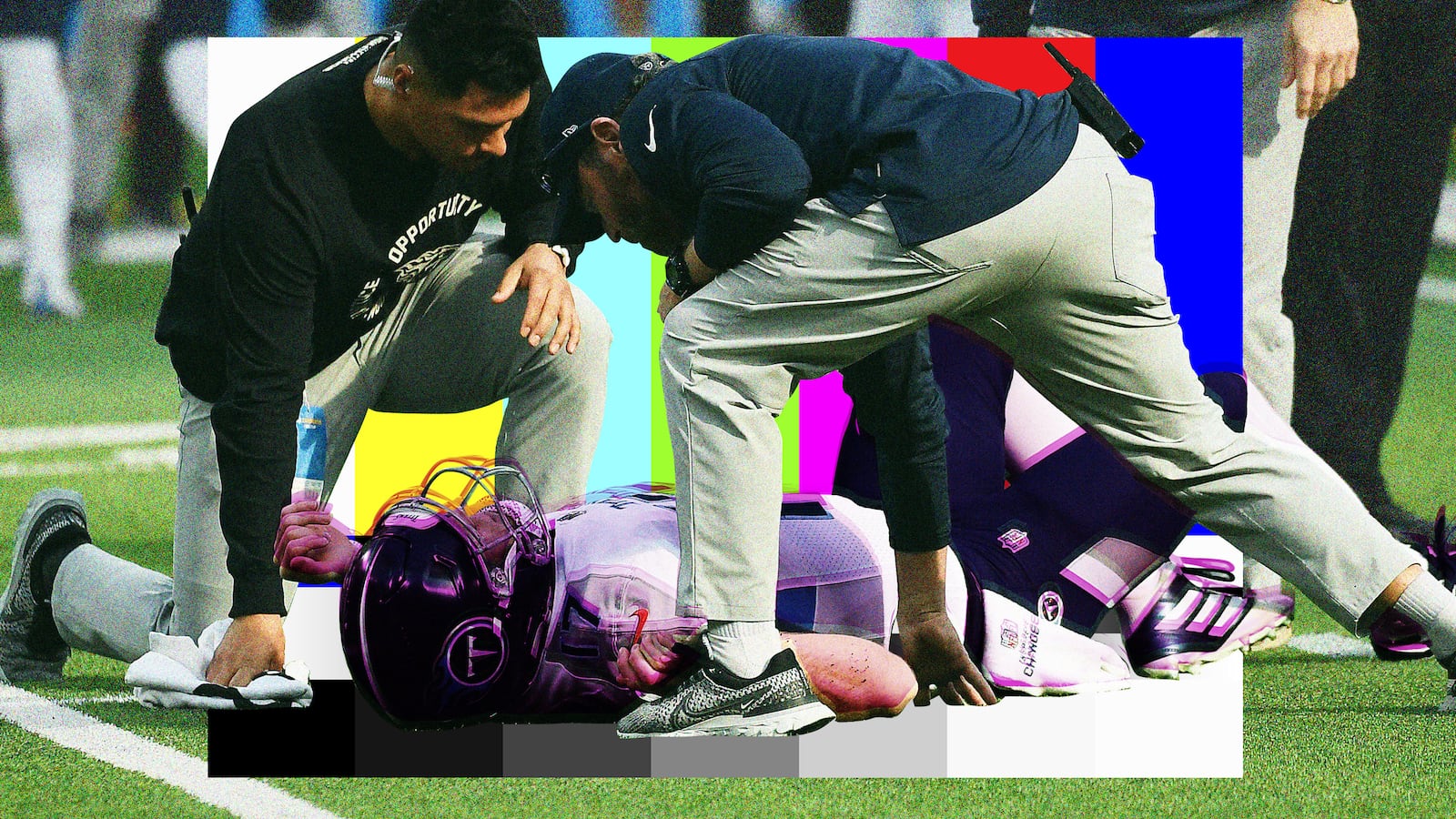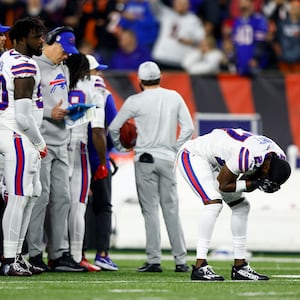This, as you probably well know, is the NFL on Fox theme song. Whenever you watch an NFL game on Fox, you hear this thing about 20 times in the span of several hours. You hear it during the pregame show as Terry and the boys are going off. You hear it before kickoff, as the network goes to commercials after a big touchdown, and during notices about other future NFL matchups.
For a song that serves so many functions over the course of a single viewing experience, it is not very universal. In the narrow context of sports TV themes, it’s like most of them, if a little extra. A rhythm track anchored by a big, booming drum, a hard-charging snare, a (possibly synthetic?) hi-hat playing eighths, cymbals beat to the edge of their lives, and a chugging rock guitar line. A relatively muted piano, trumpets, the aforementioned guitar, and some sparing strings play a subtle, structural melodic part. But the boss, the reason we’re all here, is that classic BAH BAH BAH/BAH BAH BAH/BAH BAH BAH/BAH BAAAAAAAH, played by roughly 3,000 trumpets. It’s the herald of football’s arrival: hell’s angels perched on top of the dome, singing their song of triumph at the very idea that it is, once again, NFL Sunday.
If this song’s role is overextended across the broadcast, it’s only because it is perfect: a muscular, jacked piece of music that’s as triumphant, militaristic, and fun as the occasion demands. Everything the NFL aspires to as a product is contained in these notes and the feelings they conjure. And sure, when you hear it a million times, it becomes nonsense in the front of your mind, but it buries deep like the bell in Pavlov’s dog brain, telling you, when it BAH BAH BAH/BAH BAH BAAAAAHs, that the triumph of football is imminent.
Unfortunately, sports are not all about victory and defeat. Sometimes, sports are about tragedy. For this, the NFL on Fox theme has a contingency.
Whenever the broadcast has to cut away from the game because of an on-field injury (an all-too-common occurrence in a contact sport), we are regaled with the NFL on Fox Theme: Injury Remix. The booming snares are replaced with a smaller sounding drum machine, a little bit of funk programmed into the hi-hat buttons. The big melodic backend is replaced by a single electric bass playing a sexless Steely Dan funk line. A small new-agey keyboard effect creeps around the margins of the track.
The trumpets, the sound of football’s rising tide, sit in their cases. Their part is now played by a mournful, Bruce Hornsby-style piano: an acknowledgement that football can also be sad. But it is still football, and it must be acknowledged that it is football, which is why you are still hearing the NFL on Fox theme song, but just a little sadder now. Every time I hear the NFL On Fox Theme (Sad Version) over a guy sitting on the field while being tended to by training staff after some errant hit left him with a broken leg or a torn ACL or what have you, I am instantly swamped by several colinear thoughts.
First, I think, “Damn, this is funny.” It’s funny that this sad version of the jacked and juiced NFL on Fox theme exists. I imagine a guy in a studio with his eyes closed, swaying to and fro, feeling that vein of melancholy in his heart and bringing it to his performance of this sad, sad song. It’s funny that some producer once pointed out that playing the regular theme song during a cut to commercial might be insensitive, but that what most broadcasts do, cutting to commercials without any music cue at all… well, it’s just a little vibeless. Look, yes, a man has a broken leg, but we are ALSO trying to sell some stuff during the unexpected downtime it creates. Can’t we, like, half-ring Pavlov’s bell? Project some degree of sensitivity while still, you know, keeping the television-making going? I think of this producer dreaming up the sad theme. I think of other guys in the room saying, “Yes, brilliant, sir.”
Then, because I am watching an on-field football injury, I am swamped with ambivalence and dread. However, as the neuroscientist Chris Nowinski wrote in the New York Times following Damar Hamlin’s recent injury, I don’t actually think about the kinds of injuries I am usually seeing. Because, look: it’s a bummer when someone breaks their leg on a football field, tears their ACL while playing a sport, or experiences the dread of the getting-kicked-in-the-back-of-your-leg feeling that accompanies an Achilles tendon tear. But everyone out there has, to some degree or another, made peace with injury as a product of their profession. It’s sad, but in the way a lot of inevitable things about life are sad—the resigned sort of sad that accompanies the passing of time.
No, what I think about are head injuries. Concussions, subconcussive hits to the head: the gnarly inevitability that has haunted the sport for years. Depending on what’s happening and who is observing it, the problem of head injuries in football alternates between a problem to be solved through rule changes and medical procedures, and an existential threat to the very existence of football and other contact sports.
A broken leg, though it’s gnarly to see on camera, is really not much. Bones heal fairly routinely, fitness can be regained, careers can go on. There is a kind of person who, whenever there is a grisly sports injury on television, will immediately log onto Twitter and voice their disapproval, insisting that you should never watch it, and that they, for one, hated it, because they are not a sicko. It always comes off a little overdetermined, if you ask me, taking the excuse of someone getting injured to insist to as many people as possible that you don’t think the human body being broken is cool. I would honestly prefer that they gawk at injuries like they were watching Jackass instead of the performative hand-wringing about the inevitable constant of sports.
But the head—that’s different. Head injuries are inevitable in all sports, particularly bad in football and hockey, and they don’t always heal quite right. The consequences of football’s laissez-faire culture of concussion management range from tragic to horrifying, though the league has at least been taking this more seriously in the last decade. Still, we won’t know for a long time if trying a little instead of not trying at all will make a significant dent in the epidemic of chronic traumatic encephalopathy in NFL players, or if tackle football is just fucked from the root.
I still watch football. A lot of people who know all this and feel faint or unnerved about it do as well. I think that people who resort to black-and-white thinking about the game do miss some things about the bigger picture. Players have a better idea about the risks now. Football is ultimately—and the NFL sometimes seems like it’s determined to forget this—fun to play; a maddening tactical exercise where you get to knock guys over, which is more fun than polite society is willing to acknowledge. And, well, they do get paid a lot—enough that even you, if you had the gifts, might regard the risk you take when you step on the field as a decent gamble.
But whenever I hear that stupid, sad piano, I am reminded. It is the collective cringe of the entire pro football industry and its viewership, who know this can break bad but still play and watch and sell the product. The lyrics of the song might as well go, “We are con/cerned about/this but we/will still plaaaaaay.” Away from the blare of the trumpets and the marvel of witnessing the league’s weekly buffet of on-field strength and guile, one is forced, week after week, to silently sort through the complexity of personal responsibility and human wreckage to keep themselves feeling OK about the act of flipping it on every weekend.
What would an ethically perfect cut to a commercial from a broken leg look like? Simple: it doesn’t exist. There are no ethical broken legs airing on national television under capitalism. But like those people who fire up Twitter every time someone has a gnarly ankle sprain to tell their followers they don’t personally approve of injuries, Fox decided they needed to let everyone know that they’re aware this football shit isn’t all joyous. Not by suggesting ways to actually improve the league—like paying players more for their troubles, or ensuring that all NFL vets can get into the pension program, or wondering aloud if any of this is really worth it in the end—but by playing that classic theme song in a way that makes you slightly sadder than when it normally plays. Then, they proceed to show you a bunch of car commercials before getting on with the game. I guess we all deal with the cognitive dissonance of sports in our own ways.








